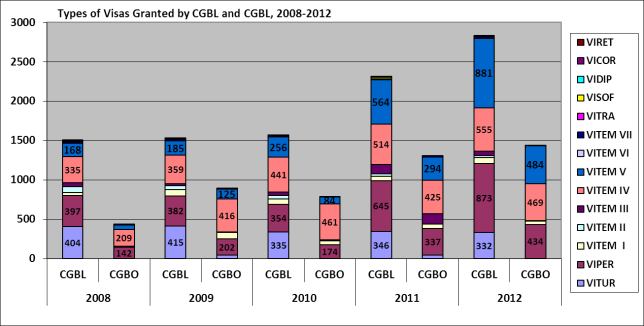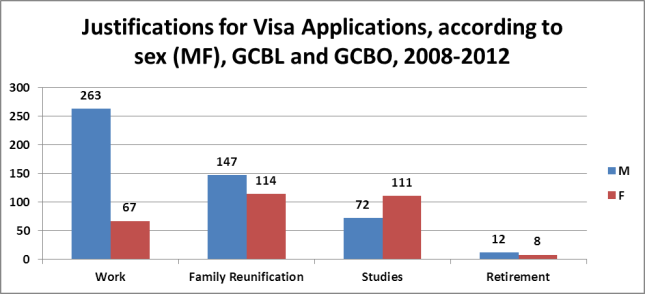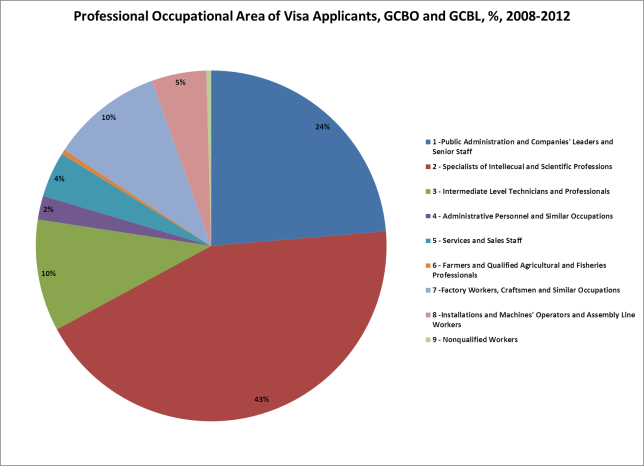Brazil’s latest general population census signalled a noteworthy increase of the Portuguese residents. Whilst in 2000 there were 143.644 Portuguese living in Brazil in 2010 the number rose to 268.486. Portugal thus made it to the list of the five principal sending countries, where it did not figure earlier.
|
2000
|
2010
|
|
Total Immigrants
143.644
|
|
Total Immigrants
268.486
|
| PARAGUAI |
35446
|
24,7%
|
EUA |
51933
|
19,3%
|
| JAPAO |
19692
|
13,7%
|
JAPAO |
41417
|
15,4%
|
| EUA |
16695
|
11,6%
|
PARAGUAI |
24666
|
9,2%
|
| ARGENTINA |
7797
|
5,4%
|
PORTUGAL |
21376
|
8,0%
|
| BOLIVIA |
6021
|
4,2%
|
BOLIVIA |
15753
|
5,9%
|
Source: IBGE[1] (Censo 2010:70)
Albeit research is underway to further describe and conceptualize Portuguese emigrants, it is still extremely difficult to estimate the volume of people leaving. One unsurmountable reason derives from the ease of circulation between the countries, for Portuguese do not need a visa to enter in Brazil and remain for up to 90 days. This possibility can be instrumentalized so as to enable finding a job, registering at an university or otherwise justifying the prolongation of the stay after being already in Brazillian territory. Yet, one way to explore the characteristics of the Portuguese population moving to Brazil (in terms of motivations, sociographic profile, and so on) is to explore the visas awarded by the General Consulates of Brazil in Portugal. Granted, such an investigation can only encompass people leaving Portugal and entering the Latin American country legally. As such, it does not cover neither the Portuguese migrants relocating to Brazil after having moved to another country previously nor people circulating as tourists. It constitutes therefore but a suggestive indication of the flow at stake. In our project, it complements the data provided by the Portuguese and Brazilian National statistics institutes (respectively, Instituto Nacional de Estatística and Instituto Brasileiro de Geografia e Estatística) as well as other mobilities’ monitoring organizations (e.g. Serviço de Estrangeiros e Fronteiras).
The data below concern the Visas granted by the General Consulates of Brazil in Oporto (GCBO) and in Lisbon (GCBL) – the two fieldwork sites in Portugal for our project. The sample is composed of 794 visas awarded in between 2008-2012 along one month, which was randomly chosen provided the Consulate’s advice to avoid the peak of requirements related to study exchanges.
There is, upfront, a striking disparity between the total amount of visas granted in the two consulates: GCBL granted 9737 visas in between 2008 and 2012, whereas CGBO only awarded 4861. However, the amount of visas awarded has remarkably increased in the last 5 years: 87 % in GCBL’s case and 156 % in GCBO’s case. The most frequently awarded visas were, in both consulates, the Permanent Visa (Visto Permanente – VIPER), the Temporary Work Visa (Visto Temporário de Trabalho – VITEM V) and the Temporary Study Visa (Visto Temporário de Estudante – VITEM IV). However, it is important to note that a series of other visas are also related to work, such as the Temporary Research Visa (Visto Temporário de Pesquisador/Cultural – VITEM I), Temporary Visa for Artists and Sportsmen (Visto Temporário de Artistas e Desportistas – VITEM III), the Temporary Religious Visa (Visto Temporário Religioso – VII) or some work-related Permanent Visas (VIPER)[2]. Therefore, as the graph below illustrates, in the majority of cases, people request a visa so as to work in Brazil.

What is more, most people leave from metropolitan areas to relocate in great urban centers. The majority of visa requests are submitted by people residing in the district of Lisbon (331 visas, which corresponds to 42%), Oporto (111 visas, which corresponds to 14%) and Setúbal (85 visas, which corresponds to 11%). In turn, most people head to the states of São Paulo (316 visas, which corresponds to 40%) and of Rio de Janeiro (168 visas, which corresponds to 21%). This means that most people move through the four research sites of our project.
In what concerns the sociographic profile, the visas indicate a working-age (25-64) masculine flow. Women are concentrated in the 15-24 age group and are more often awarded temporary study visas (VITEM IV) then men (namely, 111 were awarded these visas, as opposed to 72 men. In contrast, men largely outnumber women in granted requests for work-related visas (they have been awarded, respectively, 263 vs 67 visas). Complementarily, there are more women than men travelling as dependents of spouses granted work visas (respectively, 91 women vs 57 men). What is more, there far more men reunifying with their spouses in Brazil then women. Among them, the vast majority (87 in 90 cases) joins the Brazilian wife they married to a few years before, in Portugal.

Among the visa applicants who are employed (456, or 75%), the large majority are, according to the Portuguese National Statistics Institute,[3] highly qualified professionals (67%). The latter can be further grouped as Specialists of Intellectual and Scientific Professions (198, or 45%) and as Leaders and Senior Staff of Public Administration Offices and of Companies (108, or 24%). The remaining 33% are less qualified professional among which only 16% have intermediate qualifications: 10% (47) are Intermediate Level Technicians and Professionals, 4% (19) are Services and Sales’ Staff, and 2% (10) are Administrative Personnel. In the smallest tier we can find Factory Workers, Craftsmen and Similar Occupations (47, or 10%), Installation and Machines’ Operators as well as Assembly Line Workers, (23, or 5%), and, finally, with a residual presence, Farmers and Qualified Agriculture and Fisheries Workers as well as Non-Qualified Workers. In other words, most employed visa applicants (granted a work related visa or another type of visa) are highly qualified. However, less qualified professionals should not be overlooked.
Interestingly, the latter were often working-age men travelling with a permanent visa for family reunification. Whilst further research should investigate the lives of the qualified migrants (who strikingly contrast with the majority of Portuguese who moved to Brazil in the first half of the 20th century, and on whom were based the dominant representations about Portuguese in Brazil), these data suggest it is important to research the modes of incorporation of these less qualified Portuguese provided the specificity of their movement.

[1] Instituto Brasileiro de Geografia e Estatística
[2] Permanent Visas can encompass a number of situations: retirement; family reunification; investment in the country and work (when contracts exceed two years, which the maximum amount of time that temporary visas cover).







